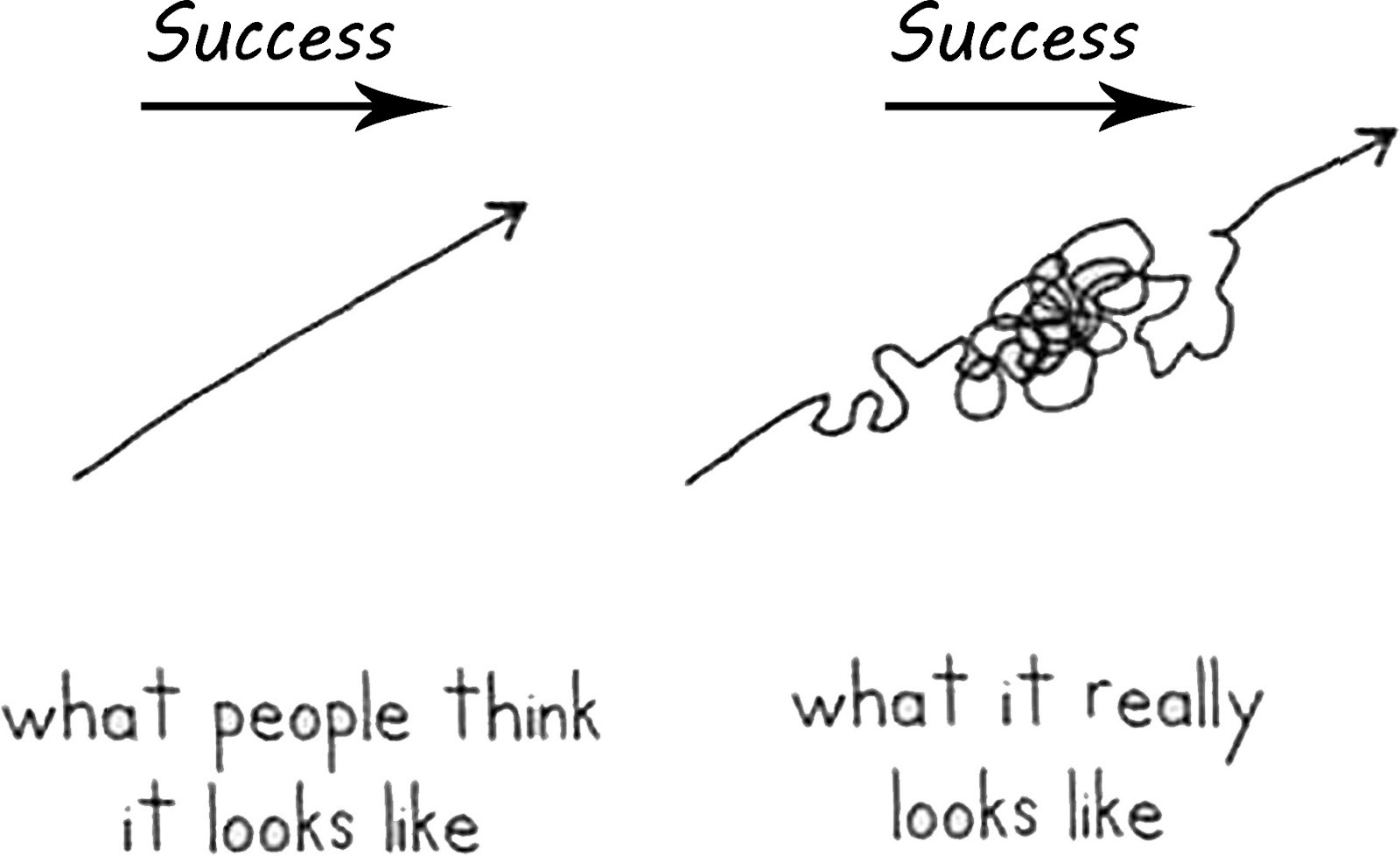Everyone who loses weight successfully overcomes a set of similar challenges. But let us be honest: successful weight loss is relatively uncommon, making many of these challenges unheard of. Consequently, when they arise, you might think you’re doing things wrong. But you’re not, and here’s why.
Images by Gor Grigoryan, pking4th, anthonycz, Oakview Studios, Peter Mooney, William Franklin, Alyssa Miller
#1: It’s More Like Learning A Language Than Training For A Marathon

If you’re overweight, chances are that you feel some guilt about it. You may feel like you’ve been lazy, gluttonous or lacking in self-control. Not only is this untrue, many of us try to quash the guiltiness by extreme behaviour and fast fixes, such as juice fasts, teatoxes and hours of cardio a day. The goal of getting fit becomes a form of self-punishment, rather than a way to improve your wellbeing.
Contrastingly, those who have successfully lost weight and kept it off (i.e. no one from The Biggest Loser) know that weight loss success looks nothing like this. Both extreme diet and exercise are recipes for failure. They know that successfully losing weight looks more like learning a language in a foreign country.
When you’re in a different country and learning their language for the first time, the overwhelming temptation is to revert to your native tongue. Of course, you can’t do that if you want anyone to understand you. Instead, you clumsily stumble over foreign words to deliver your message.
It’s difficult at first, but over time, you get better at it. You become accustomed to pronouncing things in the correct accent, and everything becomes second nature. It may become so intuitive that you have trouble teaching the language to beginners, because you’re no longer aware of what goes on when your brain translates.
Weight loss is no different — you need to learn the language of calories and macronutrients. You’ll need to translate that skim latte into numbers, using a translator at first (in this case a calorie tracking app), then fit things into your daily nutritional targets. Not unlike continuously referring to a foreign language dictionary, it’s tedious. But if you stick with it, it becomes second nature.
This is what the path to weight loss success looks like: learning fitness like you would learn any other skill. Literally running yourself into the ground by training for a marathon straight off the bat won’t help you. Nor will copying the actions of Rocky Balboa or someone already in shape. They are the subject of survival bias, and their routines probably won’t work for you.
#2: You Will Face Numerous Crushing Setbacks

You’ve probably seen the image above before. It holds true for all of life’s challenges, including weight loss. In fact, even if you do everything perfectly, weight loss shouldn’t be linear at all, thanks to the way our physiology works.
But that’s a moot point, because no one does everything perfectly. Not only will you make mistakes in your journey, you’ll face crushing, psychologically-defeating blows. Perhaps you injure yourself, or experience an emotionally devastating event. Whatever you’ve been through emotionally is then amplified worse when you step on the scale and see your progress has been erased.
But here’s the thing: from a fitness perspective, these blows are rarely as bad as you think. Overeating may cause you to gain weight, but it’s unlikely that’s all fat — the body retains water in mysterious ways.
When this happens to you, repeat after me: “I’m OK. This is normal. I just need to keep going.” Crushing blows are a part of every single major transformation I’ve witnessed. I asked a former client of mine who lost upwards of 40 kilograms, Jeremiah Bright, about his experience:
Losing weight in a healthy sustainable fashion includes pauses and setbacks. I’m part of a large extended Italian family and my weekends are filled with family events, and of course a ton of food. I’d often make a ton of progress, only to undo months of work by the end of the holidays. The same with vacations and cruises (aka floating buffets.)
Some things are in your control, some aren’t. And of the things that are, some are more than others. Injuries may be in your control, perhaps I pushed a little too hard at a deadlift when I wasn’t positioned properly or not feeling up to it and strained my back, putting me out of the gym for a few weeks. I’ve had months where the scale didn’t move… or times when I looked back at my weight half a year ago, and it was the same.
But I quickly understood this was all part of the process, kept pushing on, and am now down 140 lbs.
Every setback is not only a learning opportunity, but also a self-fulfilling prophecy: whether or not you think your progress is ruined, you are right. So stay optimistic, realise it’s not ruined, and get back on that damn horse.
#3: Other People Will Annoy the S#!t Out Of You
There are some of the remarks that every single person will hear during their transformation. From unsolicited remarks on your dietary choices, to snide comments about how you’ve changed, they’re an inescapable obstacle in the weight loss rite of passage.
“Why can’t you just enjoy life? You should just be happy with who you are.”
“Why do you eat so much chicken? Should I be eating this much chicken?”
“I don’t think your body type was ‘meant’ to be skinny.”
So how do you deal with these little shi…errr…those who are “concerned” about your well being? The first step is to separate them into two buckets.
The first bucket consists of people who are genuinely curious. Sure, their comments might seem off-the-cuff or affronting, but they probably don’t mean it. Remember: losing weight is a very personal experience, and it’s easy to be sensitive if people are questioning your choices. For example, when someone asks you about your exercise regimen, then compares it to their CrossFit WOD (because if they do CrossFit they will tell you, guaranteed), they may just be trying to build rapport through your mutual love for exercise.
Then, there are people who are genuinely trying to sabotage you. The issue with any kind of personal change is that it threatens the status quo — something that most people, consciously or otherwise, will try to fight. This is no different for weight loss.
Understanding the reason above will greatly help you reframe and empathise with saboteurs. For example, let’s say your spouse says:
I don’t know why you’re doing this to yourself. It’s like you’re not happy and you want to become someone different than the person I fell in love with.
Here’s what it might really mean:
I’m worried that if you lose weight, you’ll no longer love me because I’m still overweight. I love you and don’t want you to leave me after your newfound success.
Empathy turns the once-impermeable emotional barrier into something you can work through. If that’s not enough, Greatist has an amazing list of specific ways to respond when people attempt to undermine your health.
#4: Your Journey Is Never Over

The phrase “going on a diet” is a bit misleading. It implies a journey, with a defined beginning and an end. In reality, there is no end.
This insight stems from a very dark, personal experience. My first fitness “transformation” relied on pure willpower to get through. My spartan regimen was made up of perfectly timed meals consisting of chicken and broccoli, as well as an hour of cardio every morning. I did this for four months, lost 20 kilos, and placed in a bodybuilding competition. I thought I was finally finished dieting…and things began to unravel.
Like most competitors, I celebrated by a (perhaps excessive) dinner. I woke up the next day 10 kilos heavier. While I knew it was water, the overwhelming sense of guilt created a vicious cycle: I would console myself with food, then feel worse, eat more and begin the cycle again. Within a mere two months, I regained all 20 kilos (and then some) and was back to my original weight.
The above is a cautionary tale, because it’s not uncommon for those who think that diets have an “end”. In fact, most people who lose weight return to their pre-diet weight within three years.
If you rely on willpower, rather than learning the “language” of fitness, sure you’ll reach an “end” — but it won’t be a happy or sustainable. Everything you do should be sustainable and pass the litmus test of “Could I live like this forever?”
That’s because if you’re successful, there is no end. You’ll always have to work to incorporate fitness as a part of your new life — one where fitness is as important to you as eating, sleeping, and sex. But you won’t regret a minute of your journey, because it’s a better life.

Comments
8 responses to “Four Things Nobody Tells You About Successful Weight Loss”
Bang on the freakin’ money.
I’m going through this at the moment. I still have treats such as Maccas, or Nandos or whatever now and then, it keeps me sane. I’m not following a regimented diet, I’m just eating smarter, exercising regularly and the weights coming off. I don’t eat much red meat or much in the way of bread or rice etc any more. But by god the nagging abounds. EVERY f***ing person who speaks to me who finds out now is suddenly a goddamn dietician “Oh but you need x amount of carbs a day” “Oh but you need so much red meat” “Oh but you need so much sugar a day”
Thanks, I get it, I’m good I’ve spoken to a doctor *and* I’m fine, my blood levels have been tested, my health is good 🙂
But yet I hear all the time ‘Oh you can eat this, it’s good for you!’ from people who may mean well but don’t necessarily know better. Like my own mother, who cooked a giant lamb roast dripping with oil and fat, with potatos, carrots, quinoa etc. Telling me ‘it’s low fat and good for me and won’t make me fatter’. Acting offended when I cooked myself some chicken breast and had it with green salad.
*siiiiiiiigh*
Good on you for making the effort to change. Don’t be scared to lift heavy weights either. Head over to reddit.com/r/fitness. So much help in there and a great online community.
Everyone is different, we don’t all fit into one category for weight loss and muscle gain. find what works for you and tell everyone, thanks but no thanks.
I am about 55% of the way to my goal, having lost just over 20kg in 20 weeks. I don’t really get annoyed by people’s responses to my weight loss. Nobody has tried to lecture me about what I am eating or not eating.
The only mild annoyance I have had is from people who tell me I’m losing weight too fast. I know that as I progress further the weekly losses will become smaller and smaller, I have worked that into my goals. People assume I’m doing something risky and will put all the weight and more back on as soon as I stop but I’m not taking weight loss drugs or subsisting on celery and willpower, I’m working on a complete and sustainable change to my life.
Congrats on losing 20kg!
Now let me tell you in my expert opinion about your carbs, iron levels, what you should and shouldn’t be eating, sugar levels etc etc etc etc… lol. But seriously, well done 🙂 Great to hear!
What’s more annoying than those who comment on your weightloss is those who comment on your (or rather, their perception of your) lack of weightless. You know, the ones who click their tongues and go “you know, that’ll NEVER help you lose weight” if you do so much as dare to order something other than the heart smart salad and water.
This article is fantastic and so true – I lost about 40kg nearly 10 years ago and STILL get snide remarks from (overweight) friends about lifestyle choices I make, including eating healthy foods, being disciplined at parties by not gorging myself and refraining from consuming excessive alcohol (I drink very little).
In reality (as the article suggests), most of these comments are made by the vocal minority who are very unhappy with their own weight, lack of discipline or sense of self-worth, but they can be overwhelming at times. Luckily, the inner strength that weight loss will give you, and the improved person staring back at you from the mirror, will always be strong enough to see these inappropriate comments as the cry for help that they really are.
I read that if you don’t lose the vision then the odd maccas won’t matter. The problem occurs if you give up.